Related Research Articles

Boudica or Boudicca was a queen of the ancient British Iceni tribe, who led a failed uprising against the conquering forces of the Roman Empire in AD 60 or 61. She is considered a British national heroine and a symbol of the struggle for justice and independence.
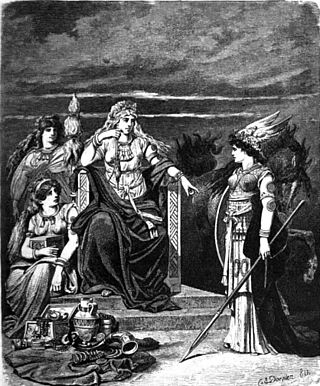
Frigg is a goddess, one of the Æsir, in Germanic mythology. In Norse mythology, the source of most surviving information about her, she is associated with marriage, prophecy, clairvoyance and motherhood, and dwells in the wetland halls of Fensalir. In wider Germanic mythology, she is known in Old High German as Frīja, in Langobardic as Frēa, in Old English as Frīg, in Old Frisian as Frīa, and in Old Saxon as Frī, all ultimately stemming from the Proto-Germanic theonym *Frijjō. Nearly all sources portray her as the wife of the god Odin.
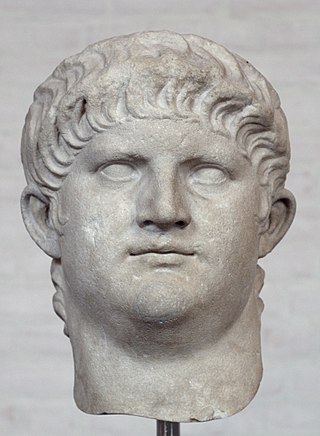
Nero Claudius Caesar Augustus Germanicus was a Roman emperor and the final emperor of the Julio-Claudian dynasty, reigning from AD 54 until his death in AD 68.

An oracle is a person or thing considered to provide insight, wise counsel or prophetic predictions, most notably including precognition of the future, inspired by deities. If done through occultic means, it is a form of divination.

The Roman conquest of Britain was the Roman Empire's conquest of most of the island of Britain, which was inhabited by the Celtic Britons. It began in earnest in AD 43 under Emperor Claudius, and was largely completed in the southern half of Britain by AD 87, when the Stanegate was established. The conquered territory became the Roman province of Britannia. Attempts to conquer northern Britain (Caledonia) in the following centuries were not successful.
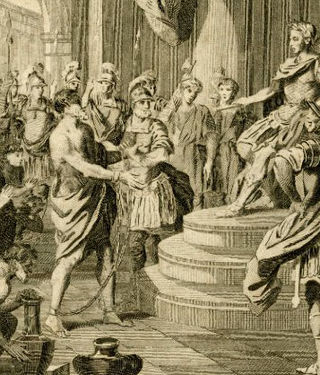
Caratacus was a 1st-century AD British chieftain of the Catuvellauni tribe, who resisted the Roman conquest of Britain.

Titus Caesar Vespasianus was Roman emperor from 79 to 81. A member of the Flavian dynasty, Titus succeeded his father Vespasian upon his death, becoming the first Roman emperor ever to succeed his biological father.

In Etruscan religion and mythology, Thesan is the Etruscan goddess of the dawn. Thesan is the Roman equivalent of Aurora. In Etruria, she received offerings together with the sun god Usil as described in the liber linteus. She was especially worshipped at Caere's harbour of Pyrgi, where a temple was dedicated to her and a singular series of "daybreak antefixes" was excavated.
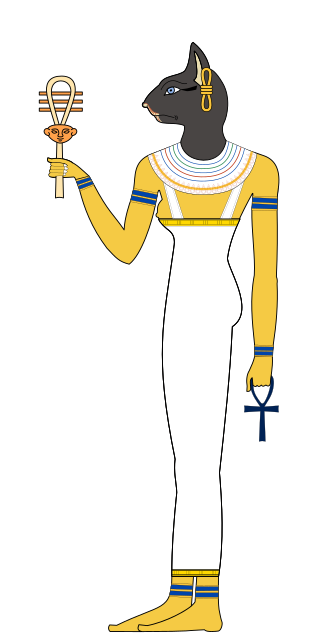
Bastet, also known as Ubasti, or Bubastis, is a goddess of ancient Egyptian religion possibly of Nubian origin, worshipped as early as the Second Dynasty. In ancient Greek religion, she was known as Ailuros.

Gaius Suetonius Paulinus was a Roman general best known as the commander who defeated Boudica and her army during the Boudican revolt.

Ēostre is a West Germanic spring goddess. The name is reflected in Old English: *Ēastre, Old High German: *Ôstara, and Old Saxon: *Āsteron. By way of the Germanic month bearing her name, she is the namesake of the festival of Easter in some languages. The Old English deity Ēostre is attested solely by Bede in his 8th-century work The Reckoning of Time, where Bede states that during Ēosturmōnaþ, pagan Anglo-Saxons had held feasts in Ēostre's honour, but that this tradition had died out by his time, replaced by the Christian Paschal month, a celebration of the resurrection of Jesus.
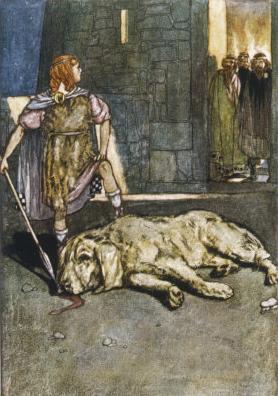
A demigod is a part-human and part-divine offspring of a deity and a human, or a human or non-human creature that is accorded divine status after death, or someone who has attained the "divine spark". An immortal demigod often has tutelary status and a religious cult following, while a mortal demigod is one who has fallen or died, but is popular as a legendary hero in various polytheistic religions. Figuratively, it is used to describe a person whose talents or abilities are so superlative that they appear to approach being divine.

The Iceni or Eceni were an ancient tribe of eastern Britain during the Iron Age and early Roman era. Their territory included present-day Norfolk and parts of Suffolk and Cambridgeshire, and bordered the area of the Corieltauvi to the west, and the Catuvellauni and Trinovantes to the south. In the Roman period, their capital was Venta Icenorum at modern-day Caistor St Edmund.
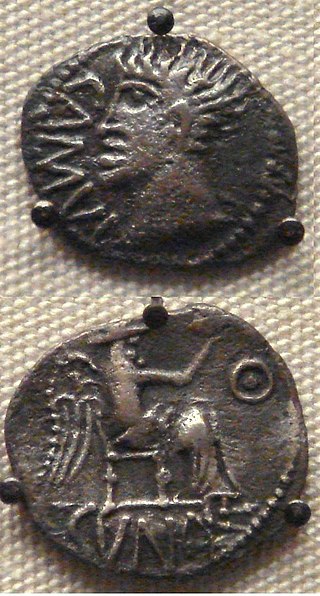
Cunobeline or Cunobelin, also known by his name's Latin form Cunobelinus, was a king in pre-Roman Britain from about AD 9 to about AD 40. He is mentioned in passing by the classical historians Suetonius and Dio Cassius, and many coins bearing his inscription have been found. He controlled a substantial portion of southeastern Britain, including the territories of the Catuvellauni and the Trinovantes, and he was called "King of the Britons" by Suetonius. Cunobeline may have been a client king of Rome, based on the images and legends appearing on his coins. Cunobeline appears in British legend as Cynfelyn (Welsh), Kymbelinus or Cymbeline, as in the play by William Shakespeare.

Julia Drusilla was a member of the Roman imperial family, the second daughter and fifth child of Germanicus and Agrippina the Elder to survive infancy. She was the favorite sister of Emperor Caligula, who, after her death, had her deified under the name Diva Drusilla Panthea, and named his daughter Julia Drusilla after her.
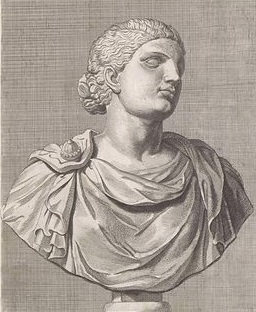
Calpurnia was either the third or fourth wife of Julius Caesar, and the one to whom he was married at the time of his assassination. According to contemporary sources, she was a good and faithful wife, in spite of her husband's infidelity; and, forewarned of the attempt on his life, she endeavored in vain to prevent his murder.
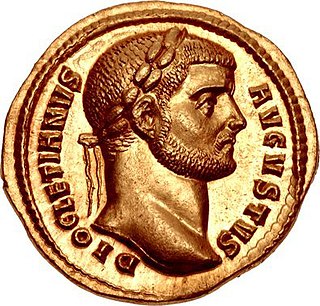
Augustus was the main title of the Roman emperors during Antiquity. It was given as both name and title to Gaius Julius Caesar Octavianus in 27 BC, marking his accession as Rome's first emperor. On his death, it became an official title of his successor, and was so used by all emperors thereafter. The feminine form Augusta was used for Roman empresses and other female members of the imperial family. The masculine and feminine forms originated in the time of the Roman Republic, in connection with things considered divine or sacred in traditional Roman religion. Their use as titles for major and minor Roman deities of the Empire associated the imperial system and family with traditional Roman virtues and the divine will and may be considered a feature of the Roman imperial cult.
In Greek mythology, Soteria was the goddess or spirit (daimon) of safety and salvation, deliverance, and preservation from harm. Soteria was also an epithet of the goddesses Persephone and Hecate, meaning deliverance and safety.

The Boudican revolt was an armed uprising by native Celtic Britons against the Roman Empire during the Roman conquest of Britain. It took place circa AD 60–61 in the Roman province of Britain, and it was led by Boudica, the Queen of the Iceni tribe. The uprising was motivated by the Romans' failure to honour an agreement they had made with Boudica's husband, Prasutagus, regarding the succession of his kingdom upon his death, and by the brutal mistreatment of Boudica and her daughters by the occupying Romans.
References
- Notes
- ↑ Kightly 1982 , pp. 36–40
- 1 2 Cassius Dio, Bill Thayer, retrieved 7 August 2011
- ↑ Green, Miranda (1995). Celtic Goddesses p. 32, British Museum Press.
- ↑ Religio Romana, "Augury".
- Bibliography
- Kightly, Charles (1982), Folk Heroes of Britain , Thames and Hudson, ISBN 0-500-25082-0

